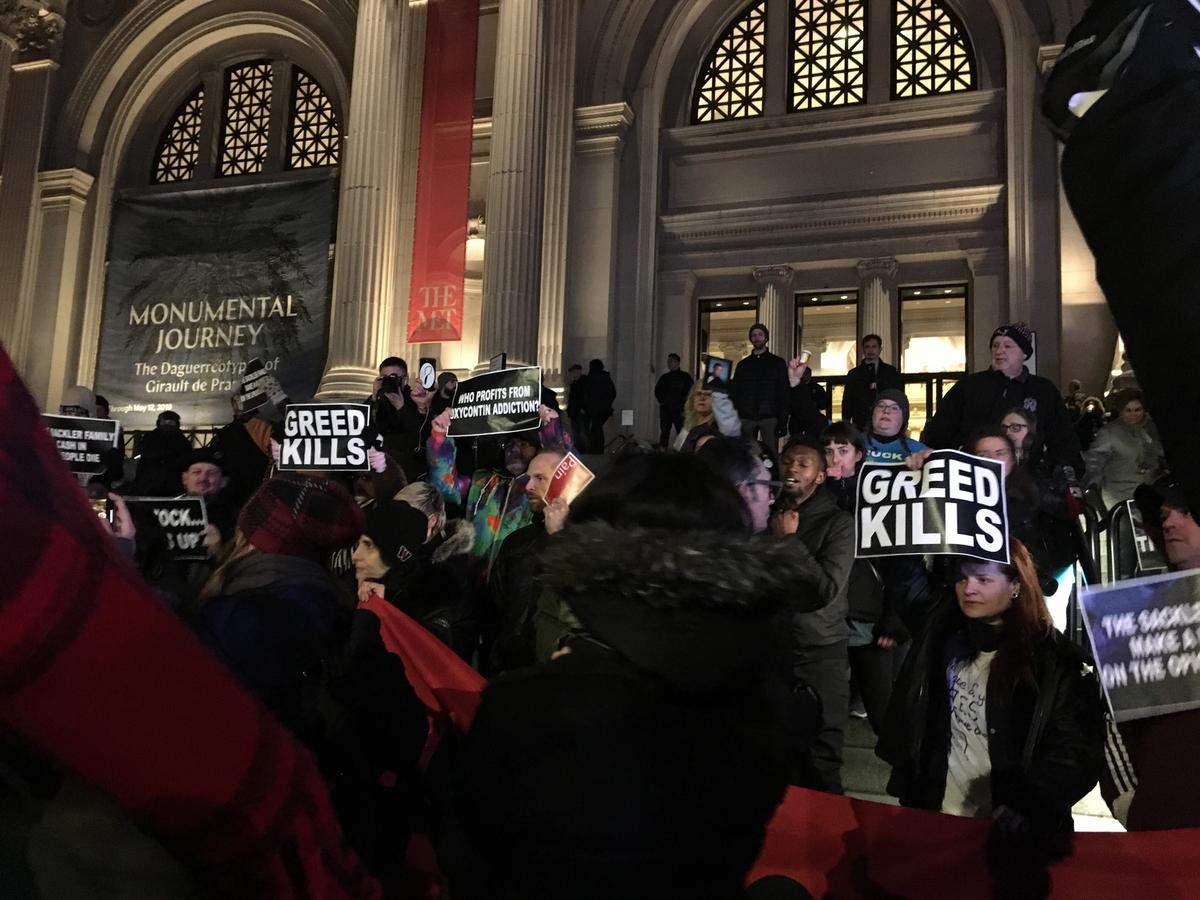Last night, the American photographer Nan Goldin and her activist group Pain (Prescription Addiction Intervention Now) held protests inside New York’s Solomon R. Guggenheim Museum and on the steps of the Metropolitan Museum of Art. The artist, who revealed she became dependent on OxyContin, has been targeting the Sackler family and its company Purdue Pharma, which manufacturers the painkiller and has been charged with misleading doctors and patients about the drug’s addictiveness. Sackler family members have been major sponsors of both museums.
“We came here a year ago and knocked on the door and the Met has done nothing,” Goldin said standing in front of the museum. She added: “They said they’re looking at their gifting policies, but what does that mean? They haven’t done anything and we’re going to come back until something happens.”
Before that, the group threw slips made to resemble prescriptions from the spiral walkways of the Guggenheim Museum, blanketing the central lobby in paper. The action was a reference to a comment by Richard Sackler that was recently disclosed in a lawsuit filed by the Massachusetts Attorney General’s Office: “the launch of OxyContin tablets will be followed by a blizzard of prescriptions that will bury the competition. The prescription blizzard will be so deep, dense, and white,” Sackler said, according to the court document.
At the Met, Goldin said that she was prescribed the painkiller after surgery for “peace of mind and social calm”. She said: “I took it for those reasons and I ended up locked in my room for three years.”
According to a pamphlet distributed at the event and designed to resemble the Met’s programme guide, 200 people die from opioid overdoses in the US every day. The leaflet states: “We love the Met [but] unfortunately this museum is tainted with the blood money of the Sackler family who lied and profited off the sales of OxyContin.” The group demands that all museums, universities and educational institutions remove Sackler signage and refuse future funding from the family.
Alexis Pleus, the founder of True Pharm and a mother who lost her son to a heroin overdose spurred by his addiction to OxyContin, said at the protest: “Believing what my doctor said made me an accomplice to my son’s death—it took 11 years but it fucking killed him and he died alone on a bathroom floor”. She added: “I don’t expect the Sacklers to care about my son Jeff, but 400,000 people? When it’s 400,000 lives, someone should care”.
Other speakers at the Met included Michael Galipeau, a co-founder of the Rhode Island User’s Union, Robert Suarez, a representative of the humanitarian group Vocal New York, and LA Kauffmann, a Pain activist who also called out the controversies surrounding Rebekah Mercer of the American Museum of Natural History and Warren Kanders of the Whitney Museum of American Art. “The Sackler family is just one of many who have been able to stand outside of the law because of their great wealth”, Kauffmann said.
Arthur Sackler’s widow, Jillian Sackler, has previously responded in a statement that her husband “died [in 1987] nearly a decade before Purdue Pharma—owned by the families of Mortimer and Raymond Sackler (his brothers)—developed and marketed OxyContin”. Mortimer (who died in 2010) and Raymond Sackler (who died in 2017) were involved in the company’s launch of the drug in 1995. “None of the charitable donations made by Arthur prior to his death, nor that I made on his behalf after his death, were funded by the production, distribution or sale of OxyContin or other revenue from Purdue Pharma. Period,” Jillian Sackler said. The gifts she mentioned in the statement include the Met’s Arthur M. Sackler Gallery of Chinese Stone Sculpture, which opened in 1965.
“Everyone needs to speak out now because it’s a dark time,” Goldin said. On 3 March, Pain plans to stage a protest in the Pfizer headquarters with the aim of pushing for single-payer universal health care proposals in the US congress.
“As we have shared, the Museum is currently reviewing its gift acceptance policies,” a Met spokeswoman says in response to the protest, pointing to the president and chief executive Daniel Weiss's earlier statement on this endeavour: "The Sackler family has been connected with The Met for more than a half century. The family is a large extended group and their support of The Met began decades before the opioid crisis. The Met is currently engaging in a further review of our detailed gift acceptance policies, and we will have more to report in due course."


